In Part 3 of the history of Richmond Junior Chess Club I left you with this news from May 1993.

This was the start of the Richmond Chess Initiative, which was doing very much the same thing that Chess in Schools & Communities now does, but on a local level, within the London Borough of Richmond upon Thames.
Local businessman Stanley Grundy had met Anne Summers, then the Mayor of Richmond upon Thames, at a concert. He had recently come across this paper claiming that chess improves children’s academic performance, and, for this reason, wanted to put money into schools in the borough.
There were all sorts of questions here about the validity of the paper’s methods and conclusions, and, given that Richmond schools, as you might expect from the nature of the demographics of the Borough, topped the national league tables every year anyway, how much scope there was for improving the results even more. But, nevertheless, Stanley wanted to donate some money, which was good news for us at Richmond Junior Chess Club.
A steering committee was formed, including representatives from local schools, notably Jane Lawrence, Headteacher of Sheen Mount, the local council and local businesses, local Grandmaster Daniel King was also invited to join and I was paid to manage the chess programme. There was no interest in putting chess on the curriculum, but a number of (mostly primary) schools were interested in starting after-school clubs. So part of my job was helping schools with these clubs, and, as more schools became interested, other chess tutors were also recruited.
All sorts of other things happened. Every year national inter-area competitions take place, run by the English Primary Schools Chess Association, at Under 9, Under 11 and Girls Under 11 levels. RJCC were now, through our committee of parents, running these teams. We were able to combine our own strong players with those from schools in the Borough, many of whom we also recruited to join us, to create formidably strong Under 9 and Under 11 teams. Although we were, in effect, competing as a club against mostly county teams we always finished near the top, winning national titles on several occasions.
Our tournaments were now billed as the Richmond Chess Initiative Championships, thanks to Stanley Grundy’s sponsorship. Here’s a game from our 1994 championship between two of our strongest young players. To play through any game in this article, click on any move for a pop-up window.
Later in 1994 Daniel King organised our first international tournament, which took place (mostly) at the Royal Star and Garter Home for Disabled Ex-Servicemen in Richmond (you can read more about chess there in this Minor Piece). The tournament – remarkably – featured seven current or former members of RJCC, along with Danish IM Klaus Berg and two of Daniel’s Bundesliga teammates.
Luke McShane, only 10 years old, struggled in most of his games, but hit the national headlines when he beat Berg, who went on to share first place with former RJCC star (as he then was) Demetrios Agnos.

The tournament was remarkable for its fighting spirit and exciting, if not always perfectly accurate games. Here’s the crosstable.
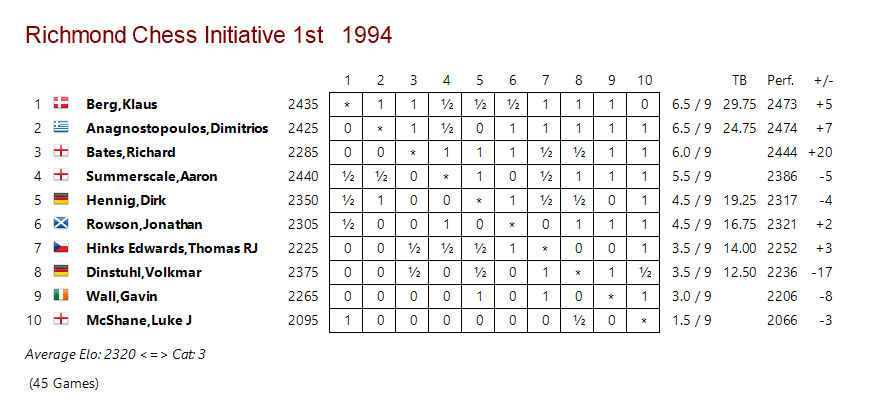
Here’s a short selection of games played by some of the RJCC representatives in this event.
At the same time we welcomed a team from Szombathely in Hungary, who played matches against a combined RJCC/Southern Counties team. Here’s a Richmond win against a future Grandmaster.
We were very big on the idea of giving our players the chance to compete against adult opposition when they were ready to do so. We ran teams in the Thames Valley League for this reason, on one occasion finishing second ahead of the Richmond & Twickenham A team.
In 1995 we were able to start a series of Richmond Rapidplays, which usually took place at the White House Community Association in Hampton. We ran six tournaments a year, with four sections, usually attracting about 100 participants, roughly equally split between juniors and adults. The top section always included IMs and sometimes also GMs, so our members had the chance to watch top players in action.
The point of what we were doing was to give our afternoon group members (1000+ rating or age 11+) the chance to play as many different opponents (of different ages) as possible, as well as to experience different openings and different time controls. Our results, and, particularly our strength in depth were testimony to the success of our approach, focusing on purposeful playing rather than teaching.
We ran our second international tournament that autumn. This time we had five past or present RJCC members, while our good friend Simon Williams completed the home contingent. Klaus Berg returned, along with popular Dutch IM Gerard Welling. The other competitors were London-based Nigerian Chiedu Maduekwe and Serbian Jovica Radovanovic. Here’s the crosstable.
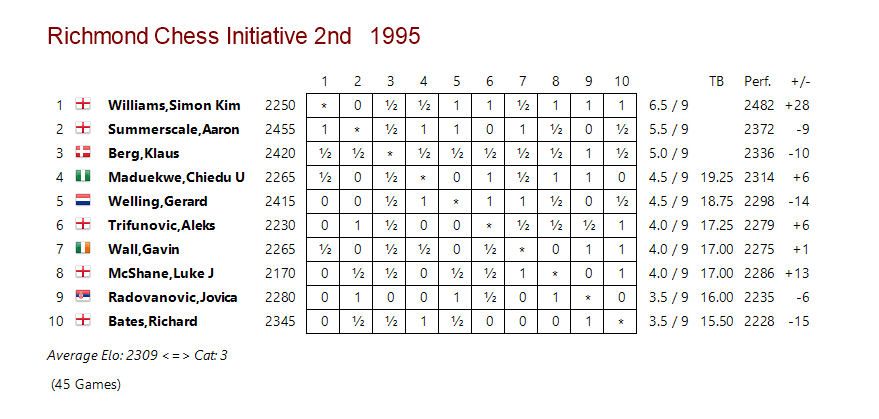
Again, a short selection of games.
Here’s our sponsor Stanley Grundy writing to the local press in February 1996, with ambitions to exend the scheme both nationally and internationallly.
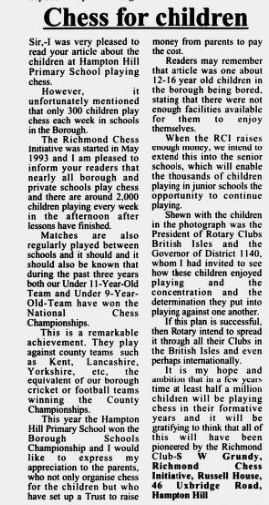
For various reasons this didn’t happen in quite that way, but the national initiative is still successful today.
One day Stanley summoned me to his office and told me he was going to make me rich. However, he then spoke to Mike Basman, who was running Surrey junior chess under the Wey Valley banner and decided Mike was the better person to put his ideas into practice.
This was the start of what would soon become the UK Chess Challenge, which was originally sponsored by Stanley through one of his companies. It’s still running very successfully today, but, far from making Mike Basman rich it had the opposite effect.
Our big annual event during this period was the RCI Schools Chess Tournament, designed as a fun event encouraging mass participation, with clocks only used on the higher boards. Here’s a report on the 1996 event.
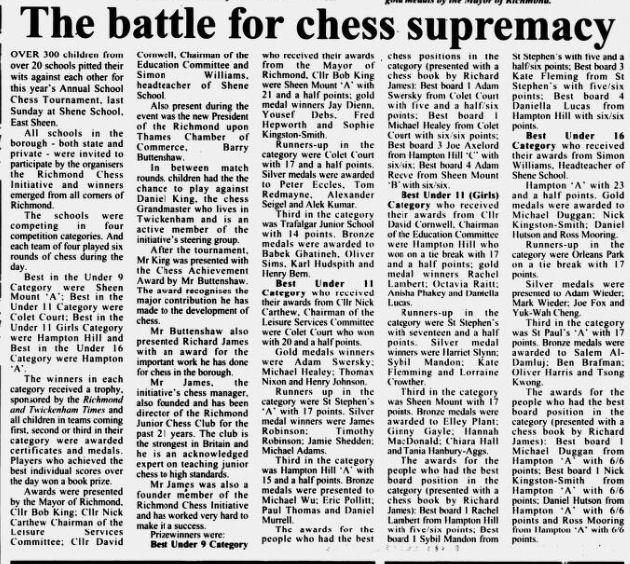
In 1996 the club received recognition from what was then the British Chess Federation when I received a President’s Award for services to chess, which I saw as an award for the club as a whole rather than for me personally.
But we were not the only successful junior club around. My friend Mike Fox was now running his own club, Checkmate!, in Birmingham, and when they visited us in 1996 scored an impressive victory. In this drawn game our Midlands opponents were represented by a future star.
We also ran two big individual tournaments every year: our annual championships in the summer term, and an open event in the autumn term including qualifiers for the London Junior Championship as well as a section for older players. Here’s a game from the 1996 renewal.
A few years earlier, as you read last time, Luke McShane was breaking a lot of international age records, but now we had in Murugan Thiruchelvam a player who was beating even Luke’s records. He impressed with his ability to play simple positions well: something I’ve always considered the mark of a promising player. In this game he outplayed his opponent in the ending even though he was the exchange down.
Although he was only 8 years old, Murugan played top board for our Under 12 team in a year in which we became national champions (against county teams) at U18, U14, U12 and U11 levels.
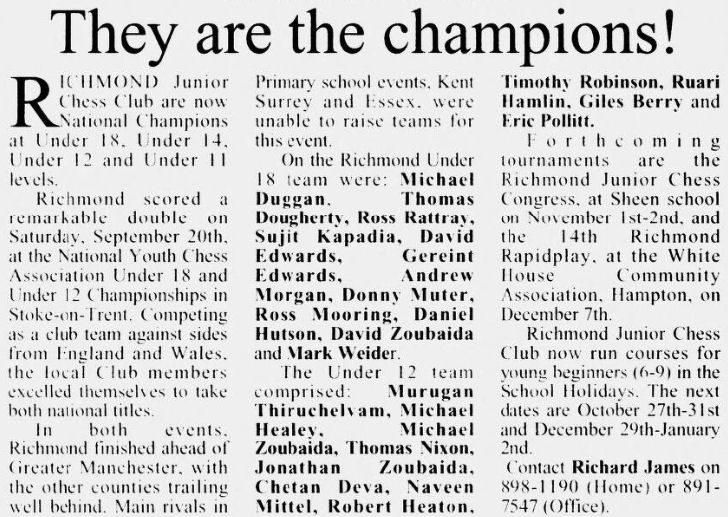
That autumn Garry Kasparov was in town, playing a simul against 25 teams. We were honoured to be invited to send a team of four players to take part in this event. We played under the name ‘Deep Yellow’, a play on Deep Blue referring to the colour of the shirts our teams wore at the time.

Here’s the game: a Kasparov victory that may not have been published before. You’ll see that we missed a few drawing chances.
This article, as well as advertising Murugan’s success against adult opponents (the Major section was the second one down in the Richmond Rapidplays), announced a workshop for young players over the Christmas holidays.
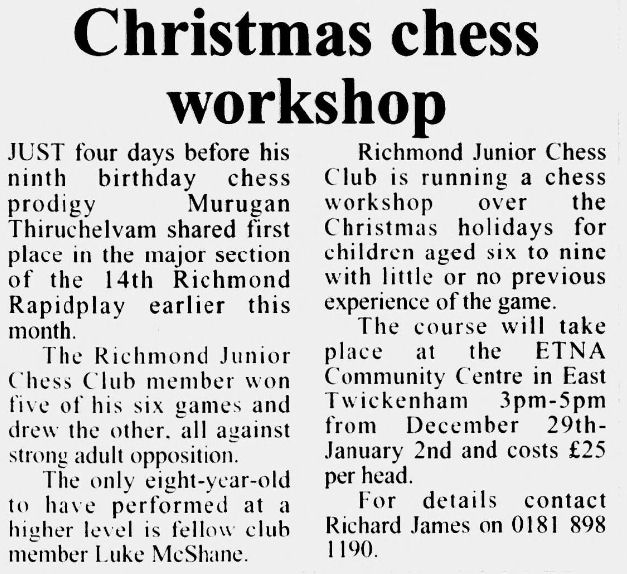
By now Luke was writing regular chess columns, here taking the opportunity to plug both Murugan and RJCC.
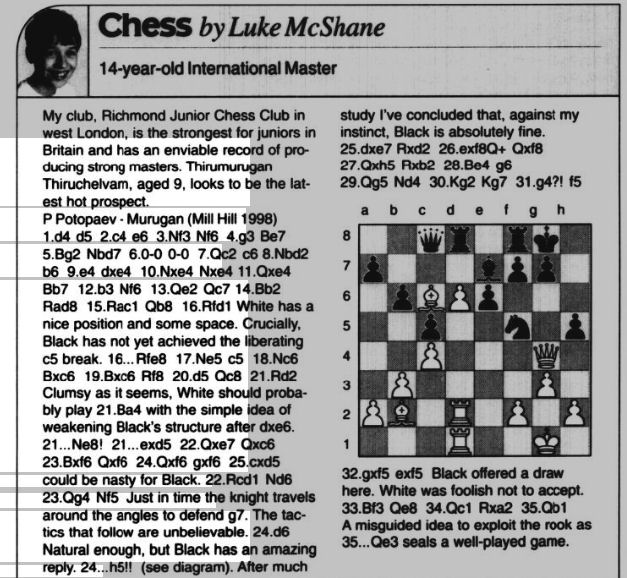
But, while the club was extraordinarily successful, I was starting to have doubts about what was happening in primary school chess clubs. For the most part the standard of play was so low that it was hard to imagine it was helping the children improve their academic performance. There was also very little interest in chess in secondary schools, so they were not continuing playing after the age of 11, seeing it as a primary school game.
The children certainly enjoyed the clubs, and we were able to encourage the stronger primary school players to join RJCC on Saturday mornings, but I struggled to see a longer term purpose.
Growing increasingly frustrated, I wrote an article expressing my views at the time, which you can read here.
Things were very different at RJCC at this point when almost every Saturday saw a new, extremely talented 7 year old turn up who had learnt from playing chess with his family at home.
One of the most notable of this generation was Robert Heaton, who, in this game, had the nerve to play the Dutch Defence against one of our favourite simul givers, Simon Williams.
At about this time the parents on the club committee decided that I should be paid for running the club. My feelings were mixed. Of course money is always useful, but I’d always seen it as a hobby which I did because it gave me a lot of personal satisfaction. They explained to me that they wanted to ensure the future of the club in case something happened to me, so I felt I had to accept.
As the millennium reached its final year Murugan made the papers again, qualifying for the British Chess Championship.
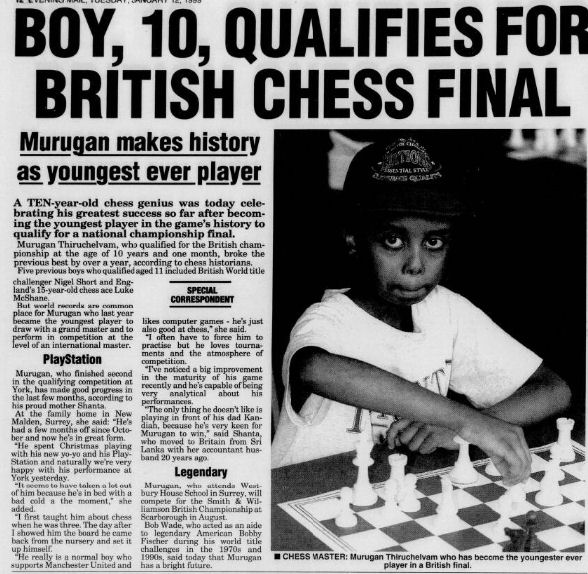
During the RCI years we were still producing national junior titles as well:
1994: Ruth Bates U14G (shared)
1995: Ruth Bates U16G and U15G (shared), Leila Nathoo U9G (shared)
1996: Ross Rattray U13, Ruth Bates U18G (shared)
1997: David Bates U15 (shared). Jonathan Zoubaida U9, Murugan Thiruchelvam U8, Ruth Bates U18G (shared)
1998: David Edwards U16 and U15, Thomas Nixon U12 (shared), Chetan Deva (U11)
1999: Shanker Menon U18 (shared)
We had had a remarkable run of success for almost a quarter of a century, but just as the calendar was changing from 1999 to 2000, junior chess was changing as well.
You’ll find out more in the final article of this series.
